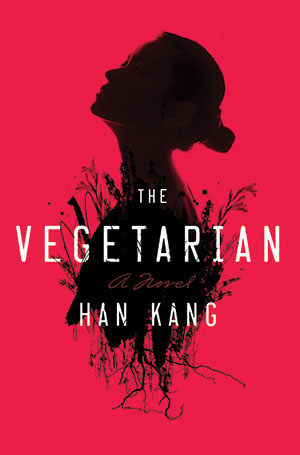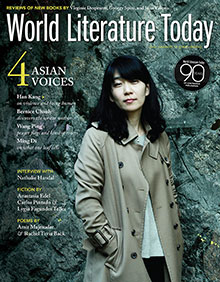The Vegetarian by Han Kang
 New York. Hogarth. 2016. 192 pages.
New York. Hogarth. 2016. 192 pages.
Han Kang’s The Vegetarian is a taut novel that tells the story of two sisters—Yeong-hye and In-hye—and their marriages. Told in three parts, each a novella in its own right, the complete work focuses on survival in a world that demands conformity.
The novel’s painful conflicts begin when Yeong-hye unexpectedly breaks cultural mores and declares herself a vegetarian, leading to her husband’s consternation, confusion, and anger over his wife’s seemingly small subversion. She lectures no one, proselytizes not in the least: she wants to stop eating meat after a vicious dream repels her from it. Her husband cannot abide this small desire of his wife’s. After “embarrassing” him at an important work dinner, he wonders, “What shadowy recesses lurked in her mind, what secrets I’d never suspected? In that moment, she was utterly unknowable.” The section ends with a haunting family scene that escalates into an act of abuse that permeates the following two sections.
Section 2, “Mongolian Mark,” gives voice to Yeong-hye’s brother-in-law. A video artist who has not produced any work due to his obsession with the idea of his sister-in-law’s birthmark, he creates a work that destroys the rest of his life so he can find out what tableau his and Yeong-hye’s body would create: “Would they seem like one body, a hybrid of plant, animal, and human?” When he is caught by his wife, he sees how his desire subsumes both of the sisters.
“Flaming Trees” brings the sisters together to come to terms with their violent upbringings. Yeong-hye now refuses to eat and is hospitalized on the edge of death. Diagnosed with anorexia nervosa, she remains misunderstood: catatonic for hours and then animal-like in her resistance to a feeding tube. Her sister sits by her bed, trying one last time to coax her sister to eat by bringing childhood favorites to her younger sister’s lips. In-hye, also separated from her husband, works to understand her sister’s motives and desires, though they remain inscrutable.
The individual remains incomprehensible in this stunning novel. Kang’s structure of three stand-alone novellas strung together to tell one larger story illustrates the loneliness of the individual who is forced to try to connect with others.
Such a separation between the individual and a community—shown through cultural mores surrounding food, illicit desires upending sexual taboos, and familial responsibilities rendering the sisters mute—is reflected by the novel’s structure and sparse prose that distances the reader from the text itself. The Vegetarian models the gulf between its characters with a reliance on disparate narratives and terse dialogue. (Editorial note: To read an interview with Han Kang, click here.)
Colleen Lutz Clemens
Kutztown University













































